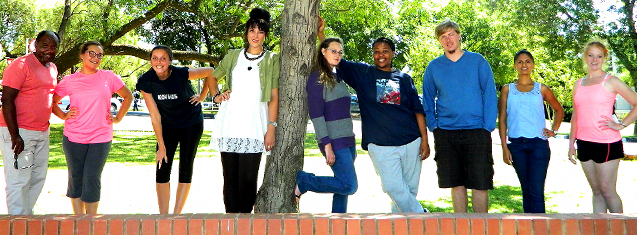
The UFS is proud to announce that nine of our Drama and Theatre Arts undergraduate students have been awarded National Arts Council (NAC) bursaries for their studies in 2015.
From the left in the photograph, these students are:
• Mbuyiselo Nqodi (first year)
• Marike Jonker (second year)
• Monique de Klerk (second year)
• Aldine van der Merwe (third year)
• Kado Cloete (third year)
• Rondo Mpiti (third year)
• Magnus McPhail (third year)
• Olivia Wyngaard (third year)
• Marica Laing (second year)
This year the amount awarded for the NAC busaries is R70 000.
Since 2005, the NAC has given bursaries to the UFS for the last 10 years. The amount varies from year to year.
“The number of undergraduate students who benefit varies depending on the amount allocated each year,” said Prof Nico Luwes, Head of the Drama and Theatre Arts Department at the UFS.
“Some years, the NAC prescribes how many students will be awarded a bursary and provides a profile of gender and academic prerequisites. Other years, such as the present one, there is no prescription and the UFS was able to cater for the applications submitted, and the number of students who will benefit, within the amount awarded. Normally, it is divided between successful candidates.”
The criteria according to which NAC bursaries are awarded to students every year include academic merit and, of course, their financial situation.”
“The full information of applicants from the Department of Drama and Theatre Arts is checked by the selection committee – all permanent members of staff in the department. The names are then sent to the NAC for approval.
UFS Finances ensures further that the bursary money is paid into the student’s class fees account. During the year and at the end, I report to the NAC on the progress shown by bursary holders. This, in turn, contributes to the excellent co-operation with the NAC so that the following year’s application is then generally successful,” says Luwes.
Bursary monies cover mainly registration and class fees for some or all modules, depending on the amount awarded.